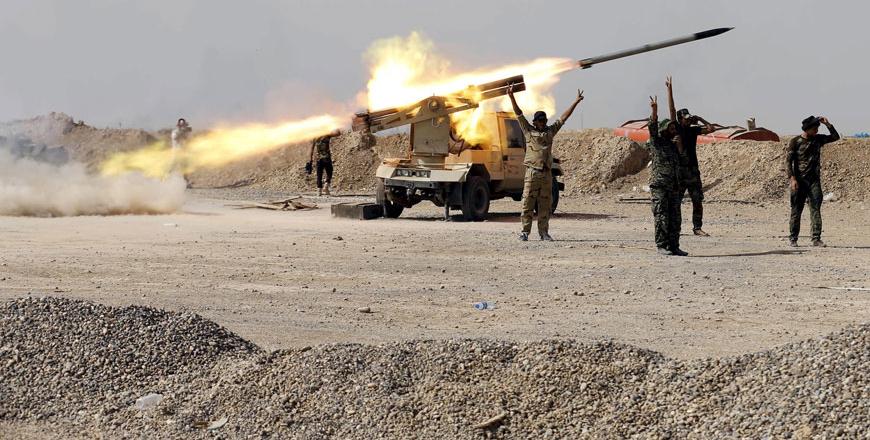You are here
Brothers in arms — Iraqi armed groups grow as Daesh shrinks
By Reuters - Apr 03,2017 - Last updated at Apr 03,2017
MOSUL, Iraq — For Iraqi police officer Jassem and his brothers, the battle against the Daesh radical group is personal. The militants captured and beheaded their father, a Shiite militiaman, in 2014; before that, the family lost another son fighting the extremists.
"We were able to identify my dad's body by the tattoo on his arm. The head wasn't found. They had also drilled holes in his hands and cut fingers off," 31-year-old Jassem told Reuters on the front line in Mosul as Iraqi forces battle with Daesh in the city.
After the murder, Jassem's youngest brother signed up with the army and another joined a Shiite paramilitary group. With a further brother already with the Counter-Terrorism Service, that meant their mother had all four of her surviving sons at war.
"Mum wasn't happy", said Jassem, not giving his full name because he works in intelligence. But his brothers still answered the call to arms. "They said Iraq was falling apart, and they wanted to protect it," he said.
The family from southern Iraq — far from Mosul which lies near the country's northern border — is just one of many where entire sets of brothers have taken up arms against Daesh out of revenge, duty or just to earn money.
The US-backed Iraqi forces are now set to drive the group from its stronghold of Mosul, taken in 2014 when the extremists seized large areas of Iraq and Syria, proclaiming a caliphate.
But the fight has further militarised Iraqi society, pushing young men into the armed forces and, increasingly, sectarian and tribal militias. This has raised fears of new outbreaks of violence once the caliphate has crumbled.
Iraq’s top Shiite cleric issued a fatwa in 2014, calling on all men able to carry arms to fight Daesh.
On another Mosul front line, Counter-Terrorism Service commando Hamza Kadhem said that before Daesh arrived, he was the only one of five brothers to have picked up a gun. “The others all joined after the fatwa,” he said.
They joined the Hashid Shaabi, or Popular Mobilisation Forces, a state-run umbrella that includes Shiite militias. Two are deployed west of Mosul, and another two near the Syrian border, where Shiite fighters have played a crucial role in cutting off Daesh supply lines.
Before the call-up, they had worked as farmers in the southern Kut region, more than 500km away.
As well as Shiites from the south, young men from around Mosul — where Sunni Muslims are in the majority — are also keen to fight.
They are now flooding to join Sunni tribal militias also under the Hashid, security officials and militia leaders say. Many residents told Reuters in recent weeks they want to join, or know relatives and friends who are trying to do so.
“Many men are volunteering in the Hashid groups. They either want to fight terrorism or to get wages,” one security officer in the area said, declining to be named because he was not authorised to speak publicly. “It’s easier than joining state armed forces. You just put your name down.”
He said the number of those seeking to join could be in the thousands, on top of the several thousand that local community leaders estimate are already in the Sunni tribal militias.
This would not pose security problems because the Hashid ultimately answer to the government and have limited powers, the officer added.
Militias spread
Provincial government officials, however, say the rising number of recruits to paramilitary forces and the formation of new militias is dangerous because it raises the risk of factional clashes.
“These Hashid groups are subservient to the people who lead them, not to the state,” said Abdul Rahman Al Wagga, a council member for Nineveh, of which Mosul is the capital.
“So if a Hashid leader wants to impose himself in a certain region, and another sheikh or clan doesn’t like it, they might attack,” he told Reuters by phone. “I think after Daesh, these groups will not be reined in... Their agendas are party, political or regional, and won’t serve Nineveh, or Iraq.”
Ramzy Mardini, a fellow at the Atlantic Council think tank, said turning to armed forces, particularly militias, was inevitable in an atmosphere where local communities fear for their own safety.
“Not only has the war further militarised Iraqi society, but there appears to be no pressure from the top or willingness from below to disarm, demobilise, and reintegrate the militias that now occupy the diverse and former insurgent landscape,” he said.
As Iraqi government forces have moved deeper into Mosul city, the areas around it have increasingly come under the control of the expanding Hashid, who fly their flags at checkpoints and have set up offices in nearby towns.
Hashid officials say they are there to ensure Daesh does not return, and that their local knowledge can make them more effective than federal police.
“Iraq’s security is our responsibility,” read a slogan painted on a building outside Mosul that is occupied by the new office of a Hashid group, and was formerly used by Daesh fighter and his family.
Most ordinary Iraqis, like the families of Jassem and Kadhem, do not want their sons to have to fight. But the young men see little choice after suffering at the hands of militants, and with few other ways to earn a living.
Related Articles
BAGHDAD — A coalition of mainly Shiite Iraqi militias advancing on the Daesh-held town of Tal Afar plans to seize a nearby military air base
ERBIL, Iraq —Militias fighting alongside Iraqi troops against the Daesh terror group are committing war crimes using weapons provided to the
BAGHDAD — Iraqi paramilitaries seen as essential in fighting the Daesh terror group are resisting moves to rein in their budget, highlightin
















